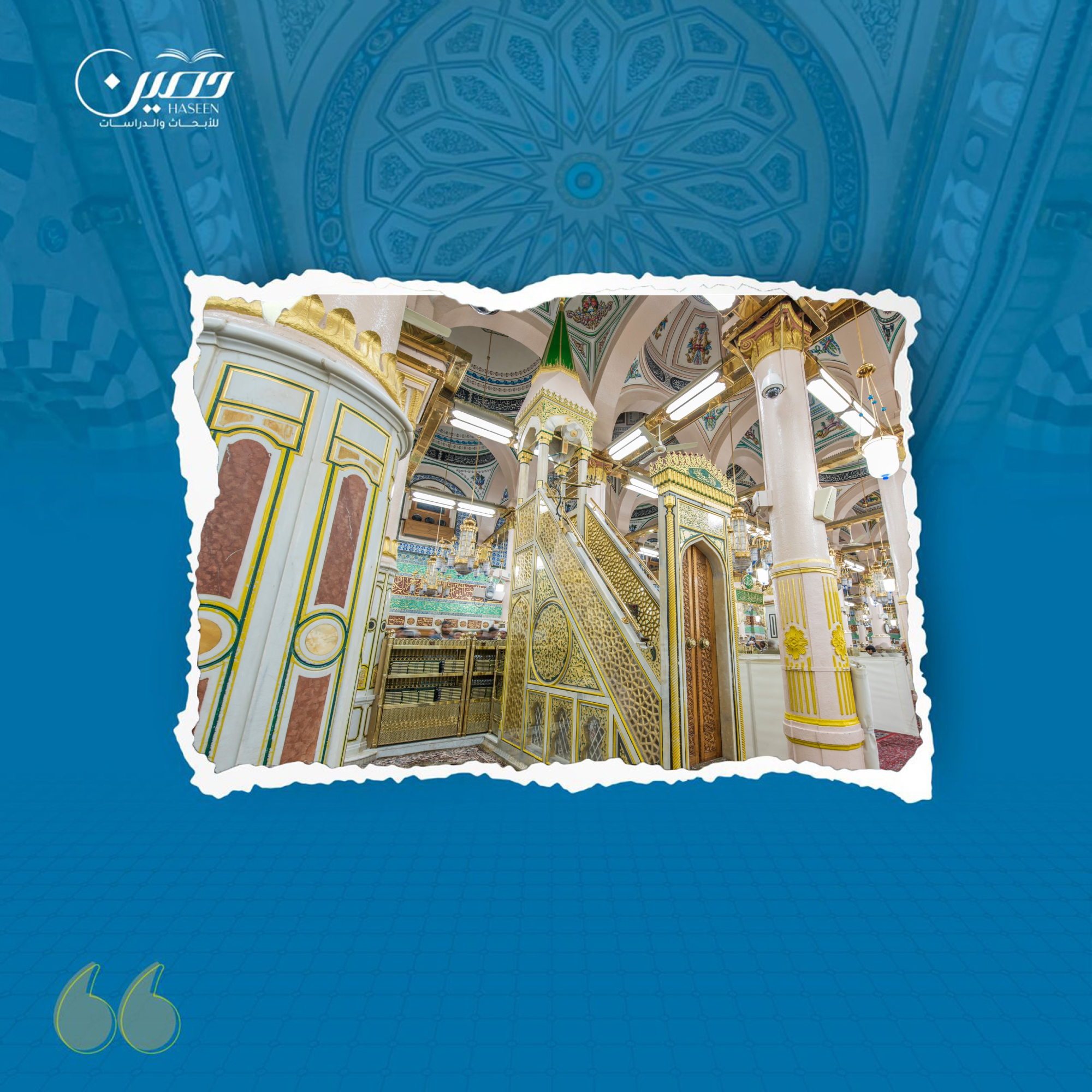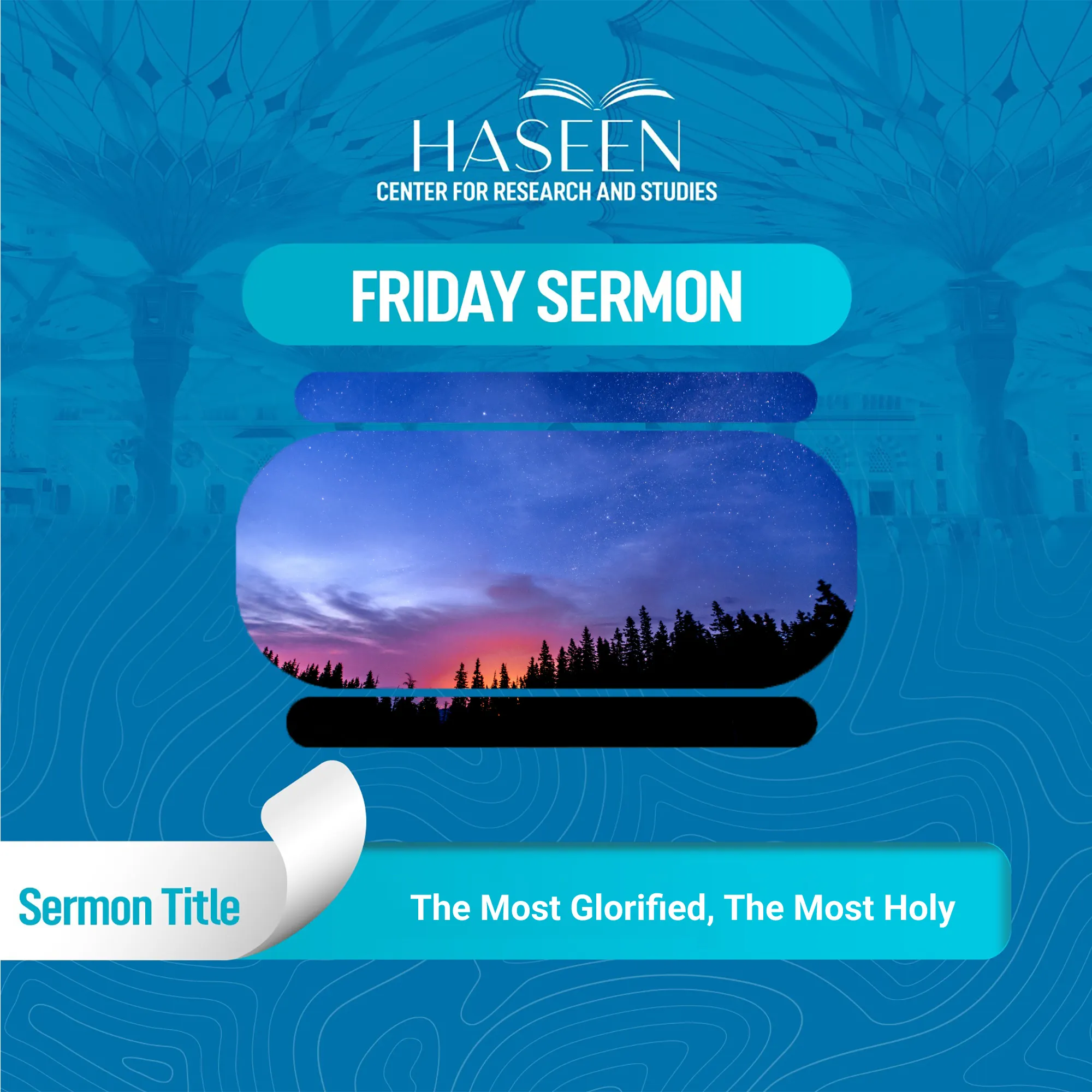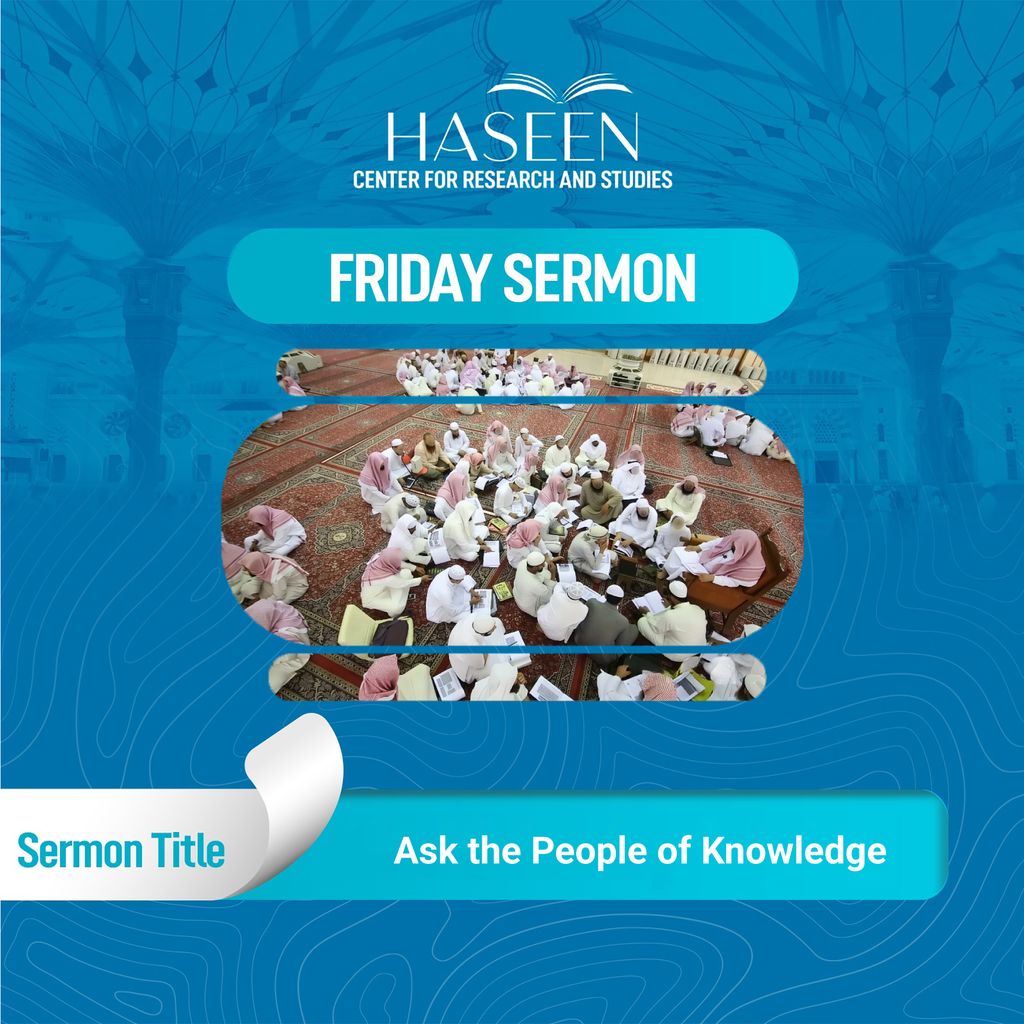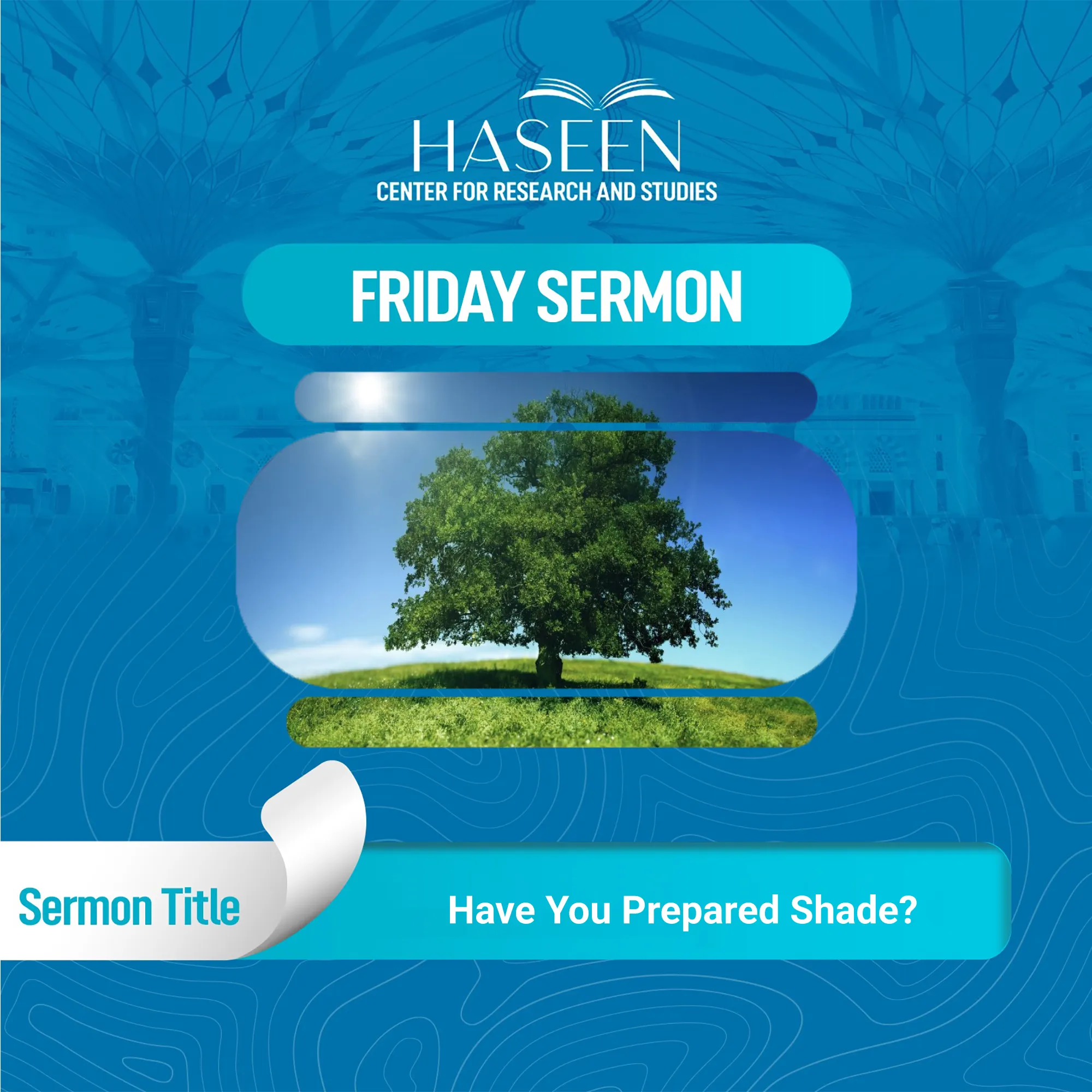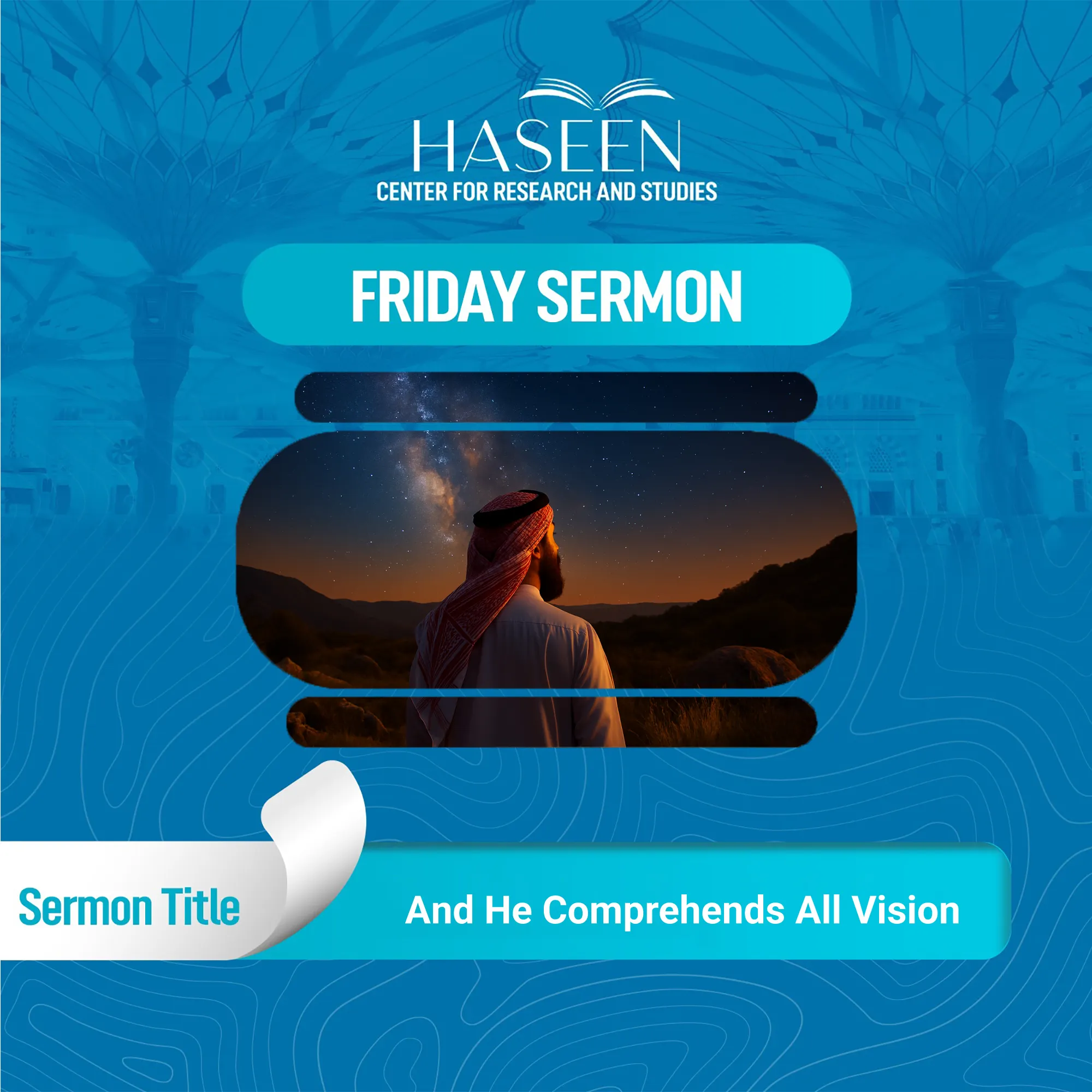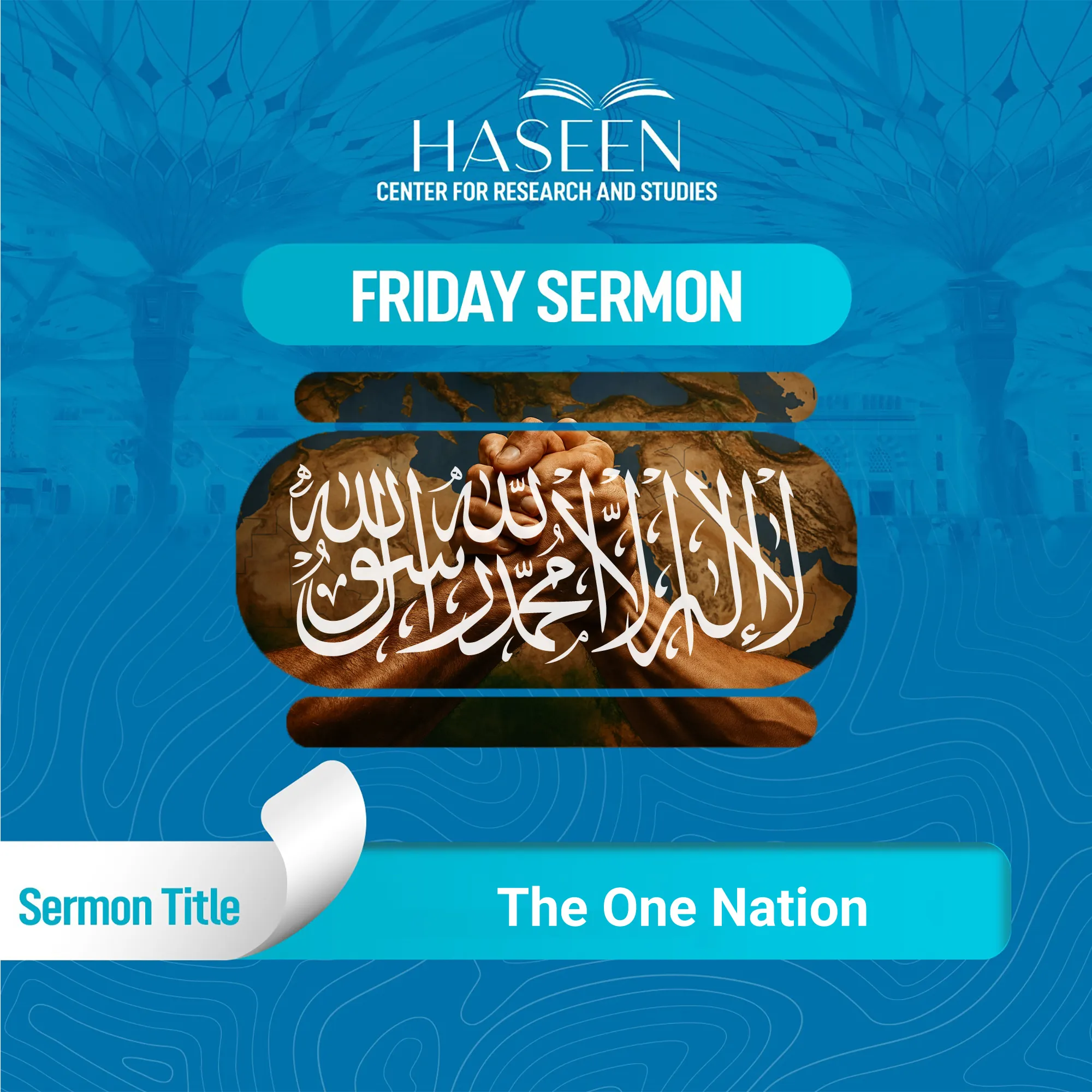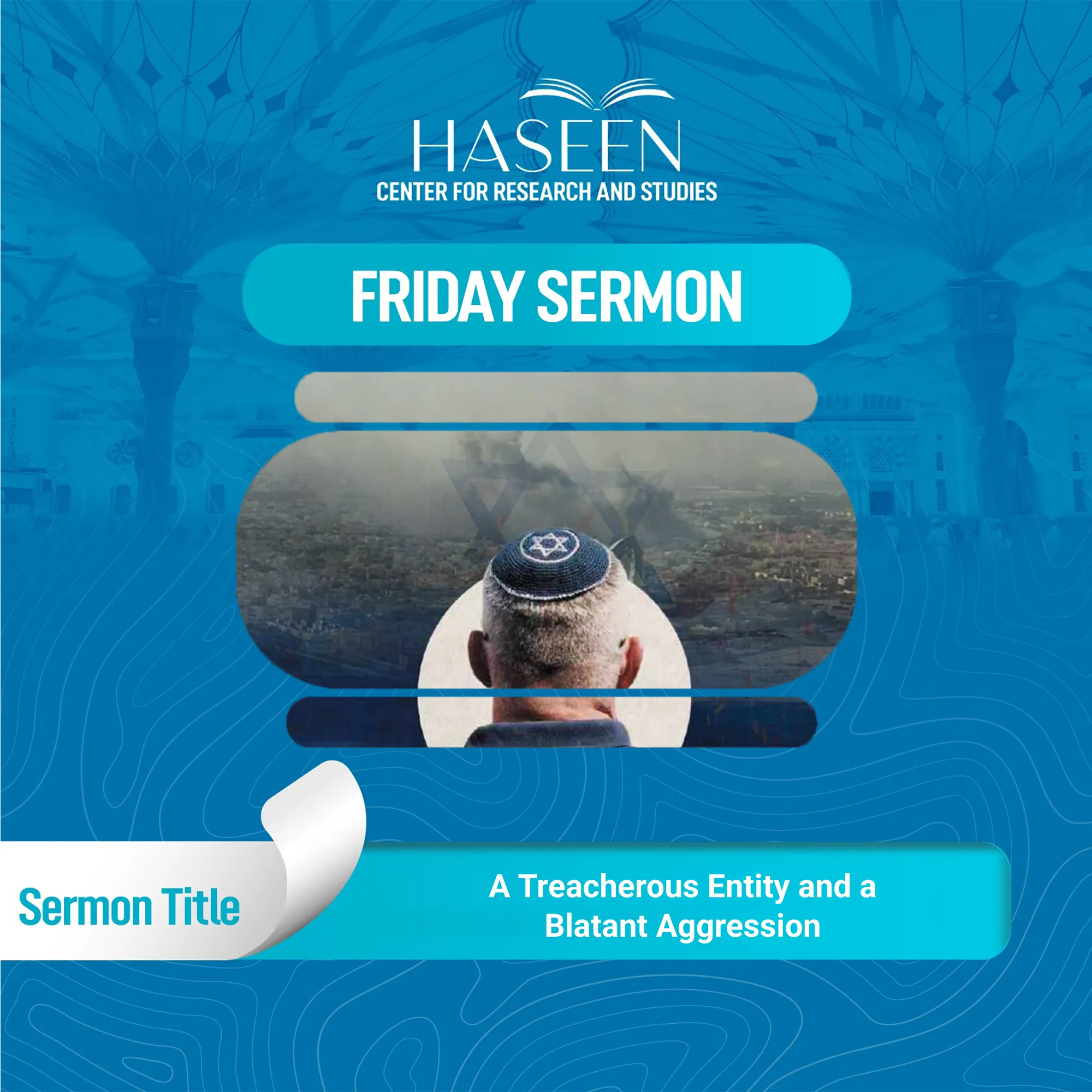Title of the Sermon:al-Ḥawḍ al-Mawrūd (The Promised Basin)
Elements of the Sermon:
1- The description of the Prophet’s ﷺ Ḥawḍ (Basin).
2- Those who will be granted to drink from it.
3- Those who will be turned away from it.
4- Responding to the deniers among the modernists and revisionists.
All praise is due to Allah, Possessor of Majesty and Perfection, exalted above any equal, rival, or likeness, sanctified from slumber, sleep, and decline. I bear witness that there is no deity worthy of worship but Allah alone, without partner, and I bear witness that Muḥammad is His servant and Messenger. May Allah’s peace and abundant blessings be upon him.
To proceed: Fear Allah, servants of Allah, with true fear, and be mindful of Him in secret and in public, as He says:
يَا أَيُّهَا الَّذِينَ آمَنُوا اتَّقُوا اللَّهَ حَقَّ تُقَاتِهِ وَلَا تَمُوتُنَّ إِلَّا وَأَنْتُمْ مُسْلِمُونَ
“O you who believe! Fear Allah as He should be feared, and do not die except as Muslims.” [Sūrat Āl ʿImrān: 102]
Servants of Allah:
We have an appointed meeting with the Messenger of Allah ﷺ. Do you know when this meeting will take place?
Let me paint the scene before you as though you see it with your own eyes.
On the Day of Resurrection, Allah will gather all nations. The Muslim nation—the nation of Muḥammad ﷺ—will be the last and the best among them.
The Prophet ﷺ said: “You are the completion of seventy nations; you are the best of them and the most honored before Allah.” (Reported by Ibn Mājah.)
While all nations kneel in humility, the sun will draw near to the heads of the people, as close as one mile away. The heat will intensify, reaching what would equal the heat of ten years, as described by Salmān al-Fārisī (may Allah be pleased with him).
The Prophet ﷺ said: “The sun will be brought near to the creation on the Day of Resurrection until it is as close to them as one mile, and the people will be submerged in sweat according to their deeds.” (Reported by Muslim.)
It will be an overwhelming heat, unbearable crowding, and an unimaginably long day filled with judgment and terrors—distress, exhaustion, and thirst so intense that the disbelievers will cry out: “We are thirsty, our Lord—give us something to drink!”
On that day, the believers will rejoice, for their Lord will have taken care of them. He will grant every Prophet a basin (ḥawḍ) from which he will give drink to his followers among the believers.
The Prophet ﷺ said: “Every Prophet has a ḥawḍ, and they take pride in whose followers will come to it the most, and I hope to have the largest number of followers coming to mine.” (Reported by al-Tirmidhī.)
The Prophet ﷺ will precede his ummah to the ḥawḍ that his Lord has granted him, preparing for them a place of drink and refreshment. It is the greatest of all the basins given to the Prophets. Its water flows from the river of al-Kawthar in Paradise. The Prophet ﷺ described its length, its width, the color and taste of its water, its fragrance, its coolness, and even its vessels—so listen to the beauty of his description.
The Prophet ﷺ said: “My ḥawḍ extends the distance of a month’s journey. Its water is whiter than milk, its fragrance is better than musk, and its cups are as numerous as the stars in the sky. Whoever drinks from it will never be thirsty again.” (Reported by al-Bukhārī and Muslim.)
Abū Dharr al-Ghifārī (may Allah be pleased with him) once asked the Prophet ﷺ: “O Messenger of Allah, what are the vessels of the ḥawḍ like?”
He replied: “By the One in Whose Hand is the soul of Muḥammad, its vessels are more numerous than the stars in the sky and their constellations. Two streams from Paradise will pour into it; whoever drinks from it will never be thirsty again. Its width is equal to its length—the distance between ʿAmmān and Aylah. Its water is whiter than milk and sweeter than honey.” (Reported by Muslim.)
He ﷺ also said: “Into it flow two channels from Paradise—one of silver and the other of gold. Its water is sweeter than honey, colder than ice, and whiter than milk. Whoever drinks from it will never thirst until he enters Paradise. Around it are jugs as numerous as the stars in the sky.” (Reported by Aḥmad.)
Do you know what happens to the one who drinks from this great basin, from that blessed water?
The Prophet ﷺ said: “I will arrive at the ḥawḍ before you. Whoever passes by me will drink from it, and whoever drinks from it will never be thirsty again.” (Reported by al-Bukhārī and Muslim.)
He ﷺ also said: “Whoever drinks from it will never thirst again, and his face will never darken.” (Reported by Ibn Ḥibbān.)
The Prophet’s pulpit (minbar), upon which he used to stand—teaching, calling, advising, and reminding of his Lord—will be brought and placed beside the ḥawḍ.
The Prophet ﷺ said: “My pulpit will be upon my ḥawḍ.” (Reported by al-Bukhārī and Muslim.)
The Prophet ﷺ will stand by his ḥawḍ (Basin), calling his ummah to drink from it, while those who are not part of his community will be turned away.
Do you know how the Prophet ﷺ will recognize you among the billions of people on the Day of Gathering?
He will recognize us by the traces of wuḍūʾ (ablution). So, what of you, O one who neglects the prayer—by what sign will you be recognized on that Day as belonging to the ummah of Muḥammad ﷺ?
The Prophet ﷺ said: “My ummah will come to me at the ḥawḍ, and I will drive away other people from it, just as a man drives away the camels of others from his own camels.” They said, “O Prophet of Allah, will you recognize us?” He said: “Yes, you will have a mark that no one else will have; you will come to me with radiant faces and bright limbs from the traces of wuḍūʾ.” (Reported by Muslim.)
There is the meeting, there is the appointment our Prophet ﷺ promised us—that he will meet us there. For he once prayed over the martyrs of Uḥud, eight years after their death, as though bidding farewell to both the living and the dead. Then he ascended the pulpit and said: “I will precede you to the ḥawḍ (meaning, I will go ahead of you to prepare your place of drink). I will bear witness for you. Your appointment with me is at the ḥawḍ, and I can see it from where I stand now.” (Reported by al-Bukhārī and Muslim.)
This appointment and meeting—you too are invited to it. Not only the Companions of the Prophet ﷺ, for he longs to meet you just as you long to meet him.
One day he said to his Companions: “I wish that I could see my brothers.”
They said: “Are we not your brothers, O Messenger of Allah?”
He said: “You are my Companions. My brothers are those who have not yet come.”
They said: “How will you recognize those of your ummah who have not yet come, O Messenger of Allah?”
He said: “Tell me, if a man has horses with white blazes and legs among black ones, would he not recognize his horses?”
They said: “Indeed, O Messenger of Allah.”
He said: “They will come with radiant faces and bright limbs from the traces of wuḍūʾ, and I will precede them to the ḥawḍ.” (Reported by Muslim.)
Do you know who will be the first people to reach his ḥawḍ ﷺ?
The Messenger of Allah ﷺ said: “The first to reach it will be the poor emigrants (al-muhājirūn), whose hair is disheveled and clothes are worn, those who never marry the pampered women, and for whom the gates of palaces are not opened—those who fulfill the rights due from them but are denied the rights due to them.” (Reported by al-Tirmidhī and Ibn Abī ʿĀṣim.)
These are the poor emigrants who left their wealth and homes for Allah’s sake, who came to Madīnah and lived their lives in poverty and need. Each one of them may have possessed nothing but a single garment. The pampered women refused to marry them, and the doors of the elite were not opened to them. They were deprived of many of their rights, yet they fulfilled all that was upon them toward Allah, His religion, and His servants without falling short. Such are they—and all who follow their path—the first to reach the ḥawḍ.
But how great will the regret be on that Day when some people from the Prophet’s ummah ﷺ are turned away from his ḥawḍ! Who are these unfortunate ones?
The first to be turned away from his ḥawḍ ﷺ are those few who are not truly among his Companions—those who apostatized from his religion after his death. They had been granted the honor of seeing the Prophet ﷺ and had entered Islam outwardly, but faith had not entered their hearts. Soon after his passing, they turned back from Islam. How wretched are those who died upon that state—those whom Abū Bakr al-Ṣiddīq and the Companions (may Allah be pleased with them) fought against!
The Prophet ﷺ will see them coming toward him, but the angels will prevent them. He will say: “O my Lord, my Companions! my Companions!” And it will be said to him: “You do not know what they did after you.” (Reported by al-Bukhārī and Muslim.)
And the angels will say: “These people never ceased turning back on their heels after you departed from them.” (Reported by al-Bukhārī and Muslim.)
Then a man will come, calling out: “O Messenger of Allah! It is I—so-and-so, the son of so-and-so!”
He ﷺ will reply: “As for your lineage, I know it. But you introduced innovations after me and turned back on your heels.” (Reported by Aḥmad.)
Those who are turned away from his ḥawḍ are the muhdithūn—those who introduce into the religion what Allah has not legislated, the people of innovation and misguidance, who deviated in belief and law. They will be driven away from his ḥawḍ ﷺ. The Prophet ﷺ will ask, “Why is this?” and it will be said: “You do not know what they introduced after you.” So he will say: “Away with them! Away with them!” (Reported by Muslim.)
Also turned away from his ḥawḍ will be the oppressors and their helpers—those who justified injustice and spread falsehoods on behalf of tyrants.
The Prophet ﷺ said: “After me there will be rulers. Whoever believes their lies and helps them in their oppression is not of me, and I am not of him, and he will not come to my ḥawḍ. But whoever does not believe their lies and does not help them in their oppression is of me, and I am of him, and he will come to my ḥawḍ.” (Reported by al-Nasāʾī.)
May Allah bless me and you through the Noble Qur’ān, and benefit us through its verses and wise reminders. I seek Allah’s forgiveness for myself and for you, so seek His forgiveness—for He is the All-Forgiving, the Most Merciful.
Second Sermon
All praise is due to Allah, and may peace and blessings be upon the Messenger of Allah, his family, his Companions, and those who follow them. To proceed:
Servants of Allah:
ʿUmar ibn al-Khaṭṭāb (may Allah be pleased with him) said: “There will come a people who will deny al-Qadar (divine decree), deny the ḥawḍ (the Prophet’s Basin), deny intercession (shafāʿah), and deny that people will be brought out from the Fire.” (Reported by Ibn Abī ʿĀṣim.)
Indeed, belief in the ḥawḍ of the Prophet ﷺ is an obligation, and denying it is misguidance and deviation. Reports about it have been narrated by more than fifty Companions, reaching the level of tawātur (mass-transmission). Yet you still find those whose hearts are deviant rejecting these ḥadīths, claiming to be “modernists.” But they are muhdithūn—innovators, fabricators, and misguided. We say to them, as Abū Barzah (may Allah be pleased with him) said: “Whoever denies it, may Allah not allow him to drink from it.” (Reported by Abū Dāwūd.)
The authentic Sunnah is authoritative in matters of creed and rulings alike. Whatever is established from the Messenger of Allah ﷺ is proof, religion, and law. Whoever rejects a ḥadīth of the Prophet ﷺ is doomed.
As for those who claim to be modernists—they revere no religion, no Qur’ān, and no Sunnah. They revere only what the disbelieving West upholds. If the religion agrees with their desires, they accept it; otherwise, they abandon it. Their state is exactly as the Prophet ﷺ foretold:
“There will emerge from my ummah people whose desires will flow through them just as rabies flows through its victim—there will not remain a single vein or joint except that it enters it.” (Reported by Abū Dāwūd.)
O Allah, grant victory to Islam and honor to the Muslims, and destroy the Zionist wrongdoers.
O Allah, send tranquility into the hearts of those striving in Your cause, deliver Your oppressed servants, and raise high the banner of the religion by Your power, O Mighty, O Firm.
O Allah, forgive the Muslim men and women, the believing men and women, the living among them and the dead.
O Allah, guide our leader to that which You love and are pleased with, and take him by the forelock to righteousness and piety.
Our Lord, grant us good in this world and good in the Hereafter, and protect us from the torment of the Fire.
Servants of Allah: remember Allah with much remembrance, and glorify Him morning and evening.
Our final call is that all praise is due to Allah, Lord of the worlds.


